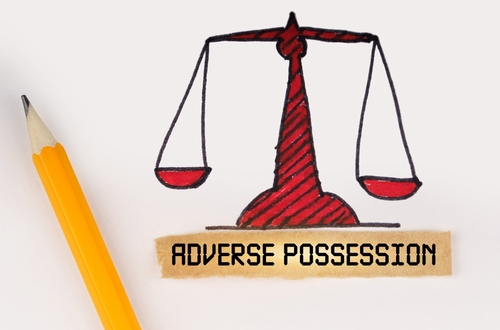
Adverse possession can present both risks and opportunities with respect to the ownership and use of real estate. Adverse possession is a legal doctrine recognized in all 50 states, that could allow someone to gain ownership of your property by, basically, treating it as though it was theirs. While these requirements may vary by state, it’s important for property owners to understand the basics of this often-misunderstood legal concept. Whether you’re seeking to utilize someone else’s land or safeguard your own, you may need to take action to protect your rights.
What is Adverse Possession?
Let’s delve into the details of adverse possession. In general, adverse possession occurs if the following requirements are met:
- Actual possession. This means the claimant is physically using or controlling the property. It could involve actions like erecting a fence or making improvements. In some states, such as Arizona, hostile intent is not necessary. In other words, adverse possession can take place even if the parties are mistaken regarding their true property boundaries.
- Open and notorious. The claimant’s possession of the property must be visible and apparent to others, not hidden or secretive. It’s important to note that the actual property owner does not need to be aware of the claimant’s use if a reasonable inspection would have revealed the trespass.
- Exclusive. The claimant must have exclusive control and use of the property, with no other individuals exercising rights over it. If this element is not met, a claimant may still be able to claim a prescriptive easement over the property—essentially the right to continue using it that way.
- Continuous. The claimant’s possession must be continuous for a specific period, which varies by state. The countdown begins when the use of the property starts. It’s also possible to “tack” time periods together. For instance, suppose the time requirement is 10 years (as is the case in Arizona). If a party has used a neighbor’s land for 4 years, but their predecessor used it for 9 years, the 10-year period would be met by adding the 4 years to the predecessor’s 9 years.
- Hostile. The claimant’s possession must be without the owner’s permission and without any legal right to do so. Hostile possession can be either intentional or unintentional but must contradict the owner’s right to use and possess the property. Permissive use is a common defense to a claim of adverse possession.
Why Adverse Possession Matters
Why should you care about adverse possession? There are several reasons:
- Adverse possession can lead to disputes and legal challenges. Claiming adverse possession, or trying to stop it, can lead to lengthy and complicated legal processes. Courts decide, after reviewing the evidence and legal arguments, if adverse possession has occurred. This can be time-consuming, expensive, and emotionally draining for all parties involved.
- Adverse possession can result in loss of property. If someone successfully claims adverse possession, you could lose important rights over your property. This can be devastating to your property value and hamper use own use of the property.
- Adverse possession can create uncertainty for property owners. Unauthorized use of a property can leave you unsure about your ownership status and right to use your own property. This can cause anxiety, stress, and make it difficult to make decisions regarding the property’s use and maintenance.
- Adverse possession can impact your ability to sell your property. Ownership uncertainties surrounding a property can deter potential buyers and make it challenging to sell or transfer the property. It is not uncommon for someone claiming adverse possession to record a Lis Pendens against the property, which is notice of a lawsuit pending to resolve the question. A Lis Pendens acts as a lien on the property that makes it nearly impossible to sell.
Protecting Yourself
What can you do to safeguard against an adverse possession claim? There are several steps that property owners can take:
- Regularly monitor the use of your property. Property owners should keep an eye on their property to ensure that no one is using it without their permission. Intuitively, you may feel inclined to warn your neighbor to stop trespassing. But this will actually feed their claim of adverse possession by establishing the hostile element. Instead, if you observe any unauthorized use that you are okay with, you should give written revocable permission. By doing this, you affirm that the land is indeed yours and that you are allowing someone else to use it for the time being. This prevents the party from later claiming adverse possession because the use would not be considered hostile.
- Maintain the property. By keeping your property in good condition, you can demonstrate your ownership and your intent to retain control over the property.
- Consult with legal professionals. If you are concerned or curious about adverse possession, you should consult with a real estate attorney who is familiar with adverse possession claims. Competent legal counsel can help you understand your rights and obligations, and can help you take legal action if necessary.
Questions about Adverse Possession?
The attorneys and staff at Orangewood Law Group have experience pursuing and defending against adverse possession claims. Contact us today if you have questions about your property rights or if someone is claiming they have adversely possessed your property.
